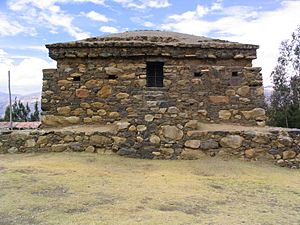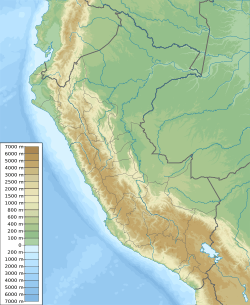Wilcahuaín facts for kids
 |
|
| Location | Peru, Ancash Region |
|---|---|
| Region | Andes |
| Coordinates | 9°29′00″S 77°30′40″W / 9.4833°S 77.5112°W |
| History | |
| Founded | 1100 |
| Cultures | Wari |
Wilcahuaín (also spelled Willcahuaín or Huilcahuaín) is an amazing ancient place in Peru. It is an archaeological site, which means it's a spot where people study old buildings and objects. You can find Wilcahuaín near a small village called Paria. This is about 7 kilometers (4.3 miles) northwest of the city of Huaraz in the Ancash Region. It sits high up in the mountains, at about 3,400 meters (11,155 feet) above sea level.
Wilcahuaín is considered one of the most important places from the Wari culture. The Wari were a powerful group of people who lived in Peru a long time ago. Experts believe Wilcahuaín was built around the year 1100 AD.
What Does the Name Wilcahuaín Mean?
The name Wilcahuaín likely comes from the Quechua language. Quechua is a language spoken by many people in the Andes mountains.
- The word willka can mean "grandchild," "great-grandson," "minor god," "holy," or "sacred." It can also refer to a type of tree.
- The word wayi in Ancash Quechua means "house."
So, the name Wilcahuaín might mean something like "sacred house" or "house of the gods." This gives us a clue about how important this place was to the Wari people.
See also
 In Spanish: Huilcahuaín para niños
In Spanish: Huilcahuaín para niños
 | Emma Amos |
 | Edward Mitchell Bannister |
 | Larry D. Alexander |
 | Ernie Barnes |


